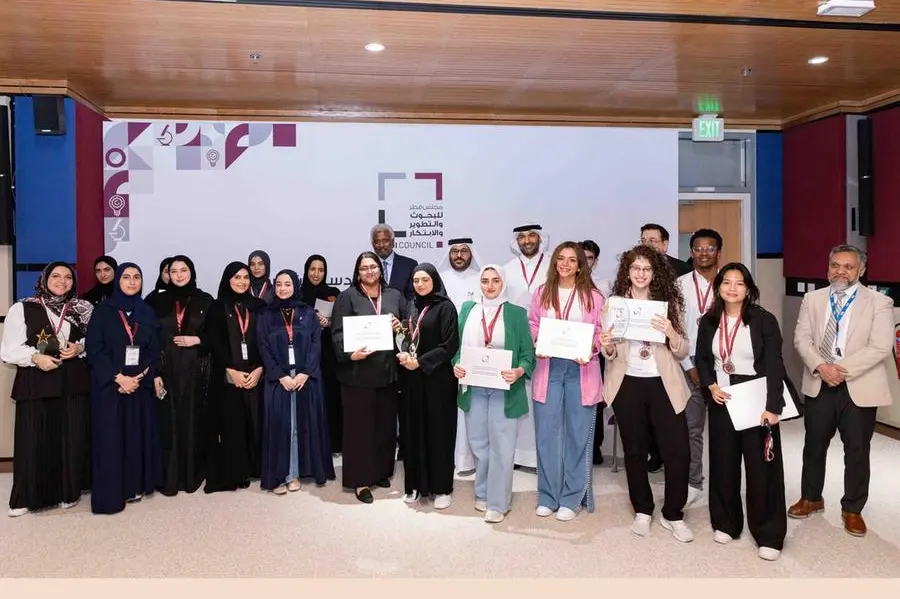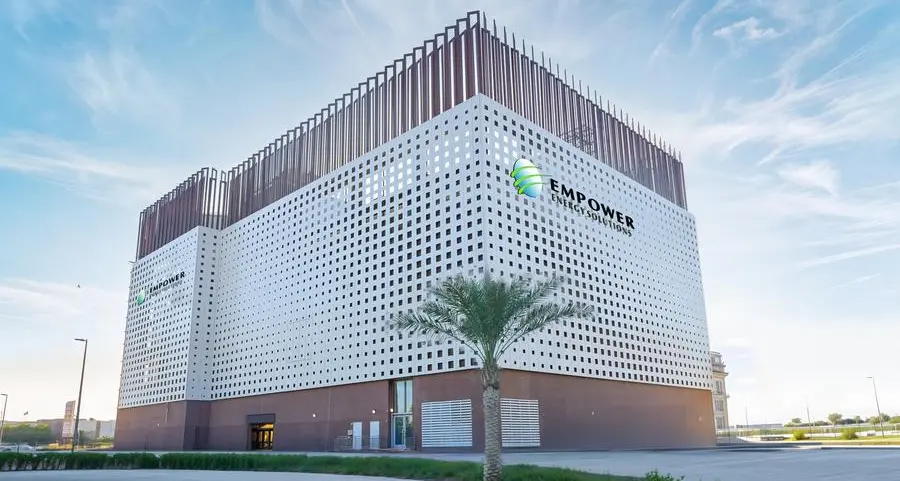PHOTO
Doha, Qatar: The Qatar Research, Development, and Innovation Council (QRDI) has announced the results of the 16th edition of the Undergraduate Research Experience Program (UREP) competition, hosted at Doha University of Science and Technology (DUST). This annual competition aims to inspire undergraduate students to advance their research skills and academic careers under the guidance of faculty mentors.
The participation involved in this year’s UREP was diverse, with students from five academic institutions in Qatar including: Qatar University, University of Doha for Science and Technology, Texas A&M University at Qatar, Northwestern University in Qatar and Weill Cornell Medicine - Qatar. Additionally, the projects covered a vast majority of subjects ranging from Environment and Energy, Social Arts and Humanities, Biomedical & Health, and Information and Communication Technology.
A panel of 14 judges evaluated the poster presentations, in addition to three judges for the oral presentations. Projects were assessed based on their significance, research outcomes, student learning experience, and presentation quality.
The competition awards are divided into two categories: the poster presentation category and the oral presentation category. This year, Kareem Fanous, Yazan Kaddorah, Aimen Javed, and their mentors Dr. Isra Marei, Dr. Hong Ding, and Prof. Christopher Triggle from Weill Cornell Medicine in Qatar secured first place in the oral presentation category with their project titled Interaction between Platelets and Endothelial Progenitor Cells: Role in Diabetes-Induced Atherogenesis. In second place, Diala Bushnaq, Raghad Aljindi, Reema Al Emadi, Sara Mohsen, Raghd Al-Shamari, Malek Chabbouh, and their mentors Dr. Shona Pedersen and Dr. Muhammad Chowdhury from Qatar University were awarded for their project eMindReader: A Deep Learning-Based Decoding System for Recognizing Inner Speech in Complete Locked-In Syndrome Patients. Third place went to Nadine Elkholy, Haya Al-Rewaily, Shouq Al-Musleh, and their mentors Prof. Othmane Bouhali and Mrs. Maya Abi Akl from Texas A&M University at Qatar for their project on Crystals Study: Positron Emission Tomography Simulations for Pediatric Applications.
Additionally, the poster presentations witnessed high competition, where 45 teams presented their research outcomes. Marwa Elshazly, Sondus Jawad, Ayesha Ahmed, and their mentor Prof. Kazeem Yusuff from Qatar University took first place with their project, Community Pharmacists’ Readiness to Assume the Role of Deprescribing Inappropriate Medications for Older Adults in Qatar. Second place was shared by two teams: Aya Alabdulrazzak, Noof Al-Khal, Safa Alzneika, Sara Fetais, Tala Ismail, and Salwa Almaraghi, along with their mentors Dr. Michial Nomiks and Dr. Halema Alfarsi from Qatar University, who were awarded for their project, Molecular Analysis of BRCT Mutations of BRCA1 Protein Associated with Elevated Risk of Hereditary Breast and Ovarian Cancer; and Noor Elgergawy, Sruthi Kadampotupadeth, Mo Hamed Kurdi, Rohail Butt, Maheen Tariq, and Farah Khattab, with their mentors Mr. Azad Asgraf, Dr. Amith Khandakar, and Prof. Michael Phillips, who presented their project, Application of Artificial Intelligence and Lifecycle Assessment in Converting Organic Waste to Compost. In third place were two additional teams: Hessa Al-Thani, Abdulla Babikr, Murtaza Gundru, Haya Haji, and Wala Abdelhalim, with their mentors Dr. Mohammed Al-Hashimi and Dr. Konstantinos Kakosimos from Texas A&M University at Qatar, for their project, Self-Healing and Stretchable Next-Generation Nature-Inspired Conjugated Organic Polymers for Electronic Skin; and Ala Alardah, Amal Mahgoub, Asma Abd, Hadir Ibrahim, Noora Aboumattar, and Marwa Alani, along with their mentors Dr. Noora Al-Qahtani and Dr. Ahmed Bahgat Radwan from Qatar University, for their project, Smart Super Hydrophobic Antifouling Coatings for Seawater Systems.
The competition also recognized the winners of the Best Representative Image of an Outcome (BRIO), which celebrates visual communication of scientific concepts and research in Qatar through art. The competition this year received 46 images and amassed more than 1700 votes from the public and Qatar's scientific and academic communities. The top three BRIO contest winners were Dr. Abbirami Sathappan, Dr. Muftah El-Naas and Dr. Noor Ali Al-Maslamani.
UREP was launched in 2006, and since then it has awarded over 5400 undergraduate students from 8 universities across Qatar for their contributions to 1450 projects during the past UREP cycles including this one. Exceptionally, 1240 UREP projects have been completed in the past 18 years, emphasizing the program's enduring impact. UREP showcases QRDI Council’s consistent efforts in enhancing Qatar’s RDI ecosystem and achieving Qatar’s national vision 2030, which seeks to establish Qatar as a hub for talent in cutting-edge innovation, research and development, focusing on sustainable energy, healthcare, and technology.
One of the main elements of Qatar's RDI ecosystem is scientific research. The number of research initiatives and results being produced in Qatar is steadily rising. In order to secure the strong durability of Qatar's RDI ecosystem, competitions like the UREP seek to inspire and assist bright young minds in realizing their critical role as catalysts for advancing innovation and scientific research in Qatar.
The hands-on research program also helped to create talent for the national research infrastructure and increase faculty-student collaboration to generate pertinent research for the creation of creative solutions to national problems.
About QRDI Council
QRDI Council is a government entity with the mission to support research, development and innovation (RDI) activities as well as to develop RDI talent in Qatar. The Council strives to make Qatar a top destination for global talent and a pioneering research, innovation, and development hub with its motto “locally empowered, globally connected”. Playing a pivotal role within the Qatar National Development Strategy, the QRDI Council is actively shaping the Innovation component of the Economic Diversification goal. The Council’s commitment underlines its unwavering dedication to the Qatar National Vision 2030. QRDI Council aims to make Qatar a global innovation hub and a top choice for R&D centers worldwide, seeing RDI as vital for Qatar's growth and prosperity. To delve deeper into QRDI Council's endeavors and vision:
Website: www.qrdi.org.qa
Stay Connected: Engage with the QRDI Council on various social media channels to stay updated on the Council’s latest activities and achievements.
Follow QRDI on - Instagram - LinkedIn - X - YouTube - : Facebook




















